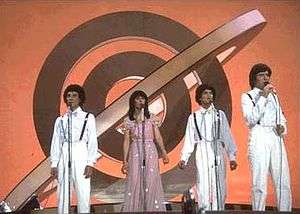Hallelujah (Gali Atari and Milk & Honey song)
 | |
| Eurovision Song Contest 1979 entry | |
| Country | |
| Artist(s) | |
| With | |
| Language | |
| Composer(s) | |
| Lyricist(s) | |
| Conductor |
Kobi Oshrat |
| Finals performance | |
| Final result |
1st |
| Final points |
125 |
| Appearance chronology | |
| ◄ "A-Ba-Ni-Bi" (1978) | |
| "Halayla" (1981) ► | |
"Hallelujah" (Hebrew script: הללויה) was the winning song of the Eurovision Song Contest 1979, performed in Hebrew by Gali Atari and Milk & Honey for Israel.[1]
History
The group was formed for the purpose of performing in the contest when the song's original performers, the band Hakol Over Habibi, declined the opportunity to sing it.[2]
This was the fourth occasion on which the host country had won the Contest (Switzerland, Spain and Luxembourg had achieved the feat before this) and there would be two more such occasions to date (Ireland winning once in Millstreet and once more in Dublin). Israel could neither host nor compete in the next Contest, which was scheduled for the same day as Yom Hazikaron - Israel's Memorial Day. (The festivities of the event would clash with the somber tone of the day, which is marked in Israel with memorial services, two minutes of silence, and large numbers of visitors at military and civilian cemeteries.)
The song is regarded as a classic of the Contest due in no small part to the unique performance, in which Atari and her backing singers entered the stage one by one, rather than all together. It was also performed at the end of the Eurovision Song Contest 1999 by all the contestants as a tribute to the victims of the wars in the Balkans. It has also become something of a modern Jewish standard, recognized by many North Americans who might never even have heard of Eurovision.
It was performed tenth on the night, following Germany's Dschinghis Khan with "Dschinghis Khan" and preceding France's Anne-Marie David with "Je suis l'enfant soleil". At the close of voting, it had received 125 points, placing 1st in a field of 19. According to author and historian John Kennedy O'Connor in his book The Eurovision Song Contest - The Official History, as Spain had been leading on the penultimate round of voting, this was the first time the winning song had come from behind to clinch victory on the final vote. Ironically, it was the Spanish jury that gifted the contest to Israel.[3]
The song was succeeded as Contest winner in 1980 by Johnny Logan singing "What's Another Year" for Ireland.
Israel did not enter the 1980 Contest, which would have been held in that country had they entered (it was in fact held in The Hague). Israel returned to the fold for the 1981 Contest, where this song was succeeded as Israeli representative by Hakol Over Habibi with "Halayla".
Chart position
| Chart (1979) | Peak position |
|---|---|
| Finland | 1 |
| Ireland | 1 |
| Norway | 1 |
| Sweden | 1 |
| Switzerland | 2 |
| Belgium | 4 |
| United Kingdom | 5 |
| Netherlands | 6 |
| Germany | 11 |
| Austria | 15 |
| Spain | 22 |
Cover versions
The husband-and-wife singing duo of Steve Lawrence and Eydie Gorme released the song in early 1979 on Warner Brothers Records. The song was a modest hit on the adult contemporary chart, and the couple also performed it on The Tonight Show Starring Johnny Carson. They also recorded a live version which was released on Applause Records in 1982.
In 1987, the Oshrat's composition was covered by Marika Gombitová, Karel Gott and Josef Laufer, and recorded under title Hrajme píseň (English: Let's Play a Song) in Czechoslovakia. As a trio (featuring solo part performed by Czech actress Věra Galatíková), the song was presented on November 1, 1987, and with alternate lyrics by Zdeněk Borovec during the pre-filmed live show Abeceda: G+L created by Česká televize.[4][5]
See also
References
- ↑ Born Again, Richard Oestermann
- ↑ The real story behind Hallelujah revealed, Maariv, August 23, 2006
- ↑ O'Connor, John Kennedy (2007). The Eurovision Song Contest - The Official History. UK: Carlton Books. ISBN 978-1-84442-994-3.
- ↑ Graclík & Nekvapil 2008, pp. 177, 424.
- ↑ Lehotský 2008a, p. 31.
- Graclík, Miroslav; Nekvapil, Václav (2008). Marika Gombitová: An Unauthorized Lifestory of the Legend of Czechoslovak Pop Music (in Czech). Prague, Czech Republic: XYZ. p. 446. ISBN 978-80-7388-115-3. OCLC 294939865. Retrieved 2011-03-21.
- Lehotský, Oskar (April 23, 2008a). Slovak Popular Music in the Years 1977–1989 – Marika Gombitová (PDF). Comenius University, Faculty of Arts (in Slovak). Bratislava, Slovakia. Archived from the original (PDF) on 2014-07-14. Retrieved 2011-04-07.
- Lehotský, Oskar (April 23, 2008b). Slovak Popular Music in the Years 1977–1989 – Modus (PDF). Comenius University, Faculty of Arts (in Slovak). Bratislava, Slovakia. Retrieved 2011-04-07.
External links
- Lyrics of "Hallelujah" (Hebrew)
- Lyrics of "Hallelujah" (English)
- Eurovision 1979 performance video on YouTube
- Steve Lawrence & Eydie Gorme recording on YouTube
| Preceded by "A-Ba-Ni-Bi" by Izhar Cohen & Alphabeta |
Eurovision Song Contest winners 1979 |
Succeeded by "What's Another Year" by Johnny Logan |